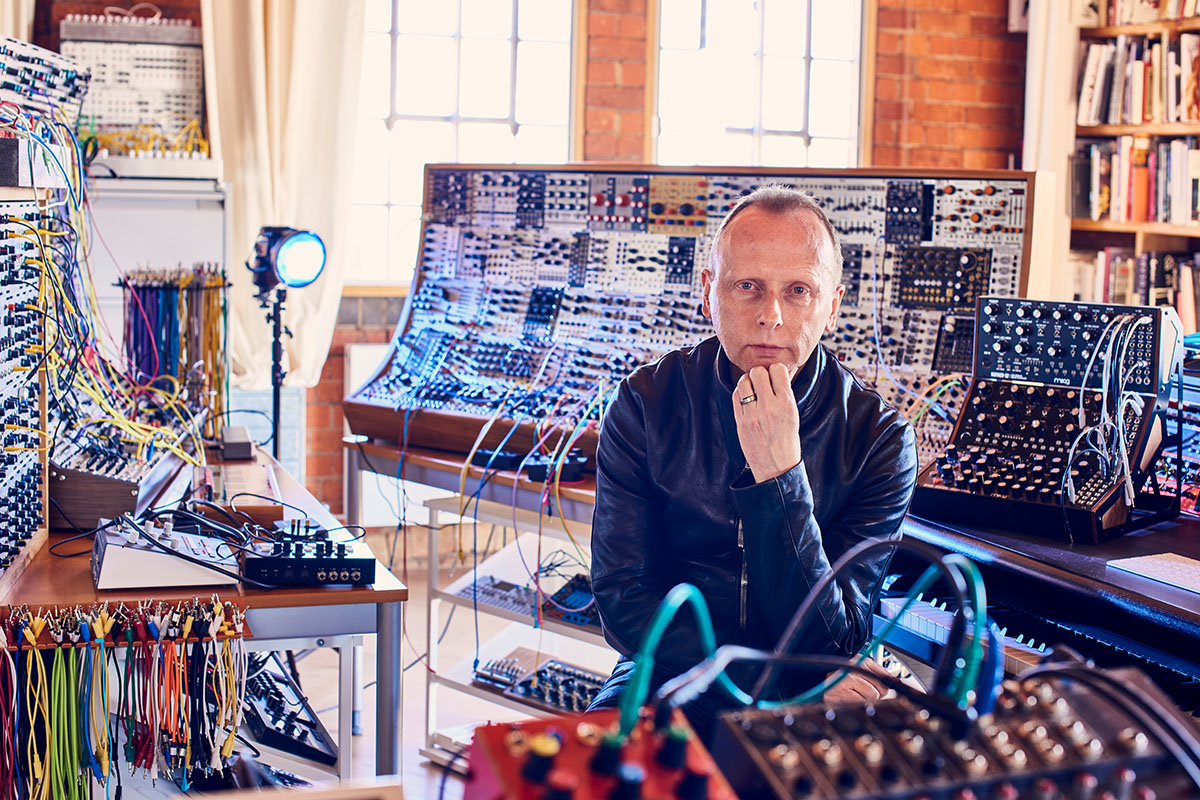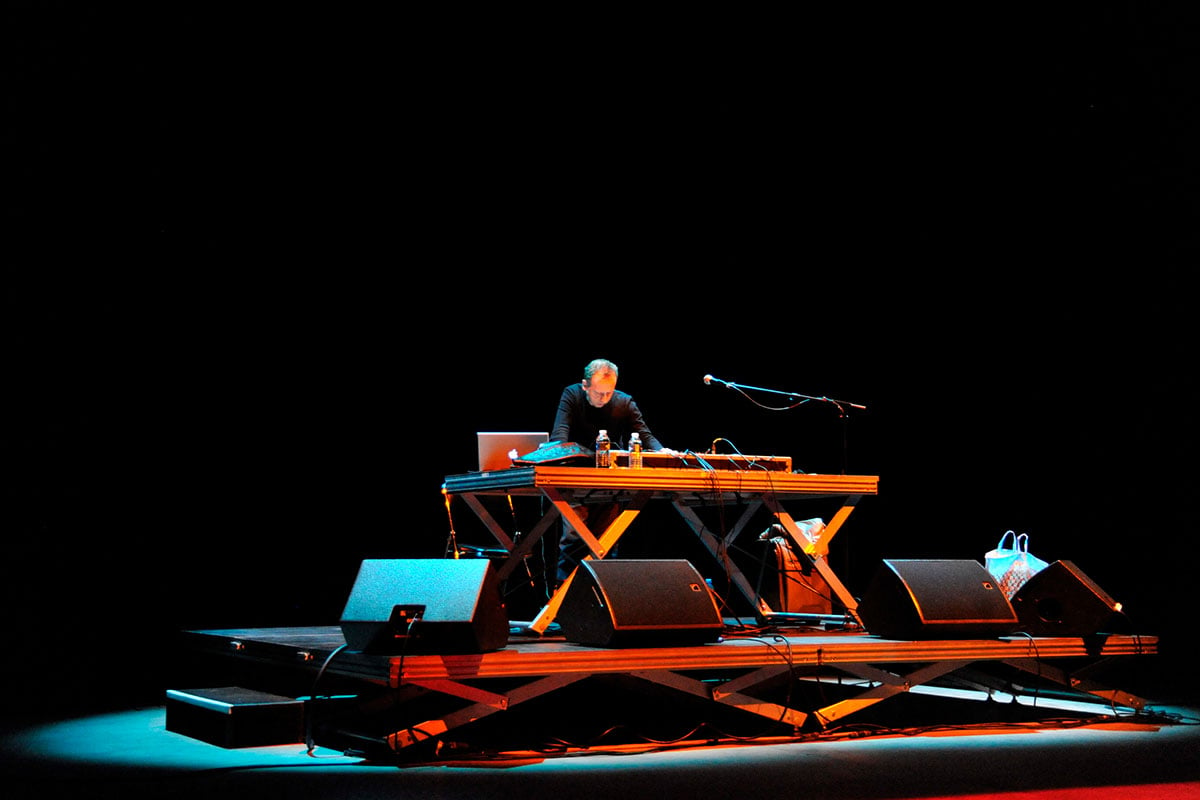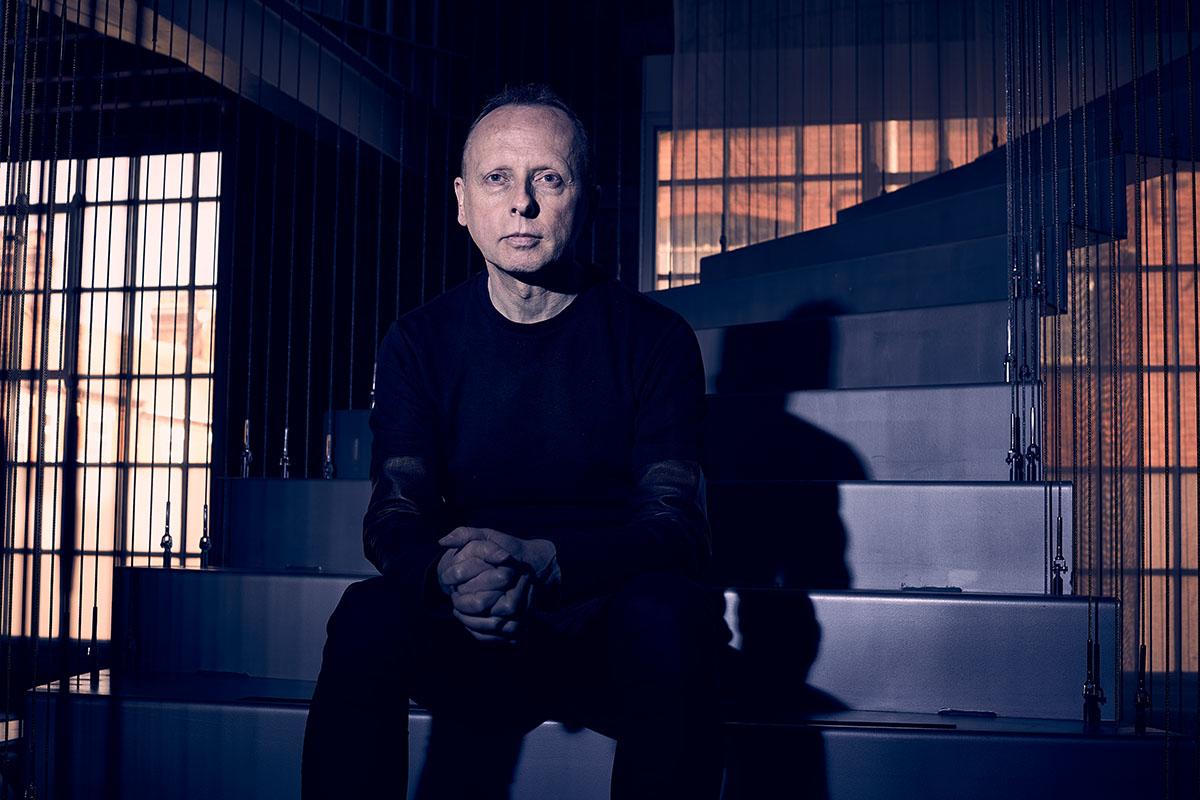“It’s perverse,” says Robin. “In some senses, nothing has changed.” The experimental electronic artist, who releases work as Scanner, is reflecting on his lockdown period. Like us all he has spent the last year at home, although unlike most he lives an old textile factory in Northamptonshire.
“I’ve been busier than ever,” he adds. “In a way I put pressure on myself to self-manage even more. I’ve never had anything in the way of a traditional system. There’s no manager, agent, record label, publisher etc. It’s generally always me who is at the nexus point of all this stuff. One might say I’m a control freak, but actually it’s more that I really care about it.”
Even a quick glance at Rimbaud’s output over the last year or so will see that he has been making music at an astonishing rate. Since 2020 he has put out more albums – nine – than most artists muster in a decade.
These span from improvised modular synth works to film scores, a collaboration with Michel Banabila, a live performance made up of downloadable sample packs, and releases that have delved deep into Rimbaud’s vast archive. All of which have been added to his ever-growing Bandcamp page, which now has its own fan club option for those who wish to try and keep up with his fecund output.
 Since 2020 Robin Rimbaud has put out nine albums. These span from improvised modular synth works to film scores, a live performance, and releases from his archive. Photo: Jonathan Stewart. © Musicians’ Union
Since 2020 Robin Rimbaud has put out nine albums. These span from improvised modular synth works to film scores, a live performance, and releases from his archive. Photo: Jonathan Stewart. © Musicians’ Union
Rimbaud has been able to operate largely as normal because he long ago gave up trying to follow the conventional path of the music industry that relies on heavy touring. A decision he charts back to a miserable day twenty years ago.
“In 2001, I was on a tour across America,” he recalls. “I was on my own. I was really depressed and exhausted because you can only afford to give yourself maybe one day off in three weeks. I should have felt exhilarated and thrilled by the whole experience but I was just spent. This guy came up to me, and it turned out to be a friend from London, and he said to me, ‘are you okay?’ I said, ‘well, let me be honest with you, we’re friends, no. I’ve not enjoyed this’. Then he said: ‘then why are you doing it?’ And I thought, this is a question we never ask ourselves.”
The unpredictability of musical work
What followed was a career period that has taken on many twists and turns while eschewing predictability and expectation. Rimbaud has released countless albums as Scanner, works under his own name, and produces countless scores for dance companies and theatre productions, sound installations, gallery works and collaborations with everyone from Bryan Ferry to Laurie Anderson and from Steve McQueen to Michael Nyman. He’s also part of the band Githead with Wire’s Colin Newman.
The musical work is often as unpredictable as the field he operates in, spanning ambient, drone, electronic, jazz, neo classical and countless others. “There’s a pattern you follow in any creative art form,” Rimbaud offers. “Which is you work towards a product or project and then you release it and then there’s a schedule around that. I realised really quickly I’m just not interested in that. So much of my work is either self-motivated, collaborative, or I get recommended.
"I don’t make decisions based upon money, which may sound foolish but it means I tend to say yes to things that are interesting and no to things that are mundane. If somebody says to me they want me to remix them I think, yeah that’s interesting. But if somebody comes along and says, ‘I’m designing a house, and would you be interested in considering making a permanent sound work that lives inside the house?’ I’m going to leap at that opportunity.”
This isn’t a hypothetical comparison either. Rimbaud was asked to work on Vex, a residential house he designed a permanent soundtrack for with Chance de Silva architects. This building won the RIBA London Award in 2018 and was featured on Grand Designs. His work is also permanently installed in a working morgue in Paris and he’s even created a live soundtrack for a wedding.
Experimenting with live streamed gigs
During lockdown he’s managed to keep up such unique projects, not only via the typical live-streamed gigs, but by expanding on the concept and pushing it into new realms, via a collaboration with the sound artist Hainbach. “He said, ‘let’s do a gig’,” recalls Rimbaud. “And I said, ‘well, we could do a gig any day. What’s the challenge in that? Let’s have fun with it’. I said, ‘why don’t we have dinner together and we amplify the dinner?’.” The result is a strange but beguiling video, turning the simple task of chewing, biting, cutting and scraping cutlery into an electronic avant-garde soundscape.
Early obsessions and a DIY approach to music creation
He began making music as Scanner in the early 90s – the name stemming from his fondness of incorporating police scanners and radios into his work, interspersing snippets of picked up conversations with heavy waves of enveloping static and immersive ambience. Obsessed with music since discovering John Cage at 11, it was clear Rimbaud was likely to go down a different musical path to most.
 Robin rarely tours in the traditional sense, instead preferring one-off performances and interesting collaborations. Photo: Aude Paget / Getty Images
Robin rarely tours in the traditional sense, instead preferring one-off performances and interesting collaborations. Photo: Aude Paget / Getty Images
“Ever since I was a teenager I enjoyed being a catalyst for making things happen,” he says. “If I can just light a spark and it leads to these other things rolling along, that’s great. I don’t need to be a pop star. I don’t need to have my face on every magazine. Further down the line after you’ve done it long enough, you realise the balance of contentment and creativity is really important.
"When you’re younger, maybe you go chasing for ego and you go chasing for that dream of success, whatever that actually means.” So indifferent to what conventional commercial success may look like, when once he had a European tour lined up, he sent 12 lookalikes to go and play in his place.
A staunch DIY ethic has always been central to his work. Despite working with many collaborators, institutions, labels, galleries and venues, he’s managed to navigate a singular path through an industry known to throw up plenty of compromising hurdles.
As a teenager, he hired his own venues in London to put on shows because nobody else would, and after falling in love with industrial, experimental and avant-garde music he threw together a successful compilation album on his own label featuring Coil, Nurse With Wound, Test Department, Derek Jarman, Lydia Lunch, Rowland S Howard and Current 93. “What that showed me is if nobody’s going to do it for you, you just do it yourself,” he says. “If somebody is not going to support you or take an interest, just take it on yourself and see where it goes and then you can only succeed or fail, and let’s hope it’s the first one.”
Ultimately, Rimbaud is all about forward momentum and not repeating oneself. “When you look back at anything you’ve done in the past you don’t want to look at it and think ‘oh I’m so ashamed by that’,” he says. “You want to feel good about it. I’ve done a number of commercial projects over the years with all kinds of people from telephone to fashion companies and you realise it doesn’t make you happy. The people can be very challenging, demanding, not very supportive, and leave you feeling kind of empty.”
 Robin wants to leave the tools of his art to younger creatives. Photo: Jonathan Stewart. © Musicians’ Union
Robin wants to leave the tools of his art to younger creatives. Photo: Jonathan Stewart. © Musicians’ Union
“If anything, I can be a model of someone who doesn’t follow any of the rules,” he reflects. “I didn’t follow any of the things you’re meant to do when you make creative work and yet I can still make a decent living. I’ve still got some money in my bank, we live in a fabulous place, and I’m quite happy. And that’s without having a number one album or any of that stuff that doesn’t really have any meaning.”
So committed to the craft is he that he has set up his own foundation, so he can hand down his home, studio, musical library – everything – to young people. “We don’t have children and we spoke about the idea of what happens when you’re no longer around,” he says. “It’s a foundation to support young people being creative, so it could be darkrooms here, there can be music studios, whatever they like. But it feels positive to offer something back. It’s a great feeling to think if I buy something today it will be used in the future.
"It acts as an inspiration for me while I’m here, but I’m also conscious that if we can help people in the future, that’s a great thing. I’m still going to be here for a lot longer, but in the last six or so years I lost my entire family so you start to reflect on these things. I’m still as enthusiastic about music now as I ever was and I want to be able to pass that on.”
Find out more about Robin Rimbaud's career and read his blog.
5 Scanner collaborations to explore
1. Quick and The Dead by DJ Spooky vs Scanner
Released in 1999, the pair were touring buddies back when Rimbaud did such a thing. This collaboration spans multiple genres, taking in trip-hop, dub, ambient, drum & bass and electronica.
2. Tinnito by Rolf & Fonky with Scanner
A collaboration with two Italian musicians Maurizio Ottavi & Mirco Uguccioni, where they gave Rimbaud free reign to explore and expand upon some initial sketches. Once again it weaves between genres, tone and BPM, drifting from engulfing ambience to glitch electronica via dystopian soundscapes.
3. Jochen Arbeit + Scanner
A live recording of improvisation between Jochen Arbeit of Einstürzende Neubauten and Rimbaud as part of the 30th anniversary celebrations of the band, recorded at The Forum in London, in October 2010. It’s a raw set that begins heavily with intense clangs of slowed down industrial techno, but it evolves into something much richer and wider, as it unfurls in heady waves.
4. The Maya Effect by Paci Dalò & Scanner
Another live improvised set that manages to capture the versatility and adaptability of Rimbaud as a performer. Minimal pulses of electronics merge with enveloping ambience and shifting atmospheres to create something that veers from minimal techno to glitchy ambient.
5. The Sound of Design by Painè Cuadrelli & Robin Rimbaud
A collaboration with the Italian sound designer, music producer and DJ. This 2016 work focuses on the sound design that saturates our lives, from TV to films, and computers to phones. Almost like a remix album of day-to-day sounds we encounter from adverts to computer games.